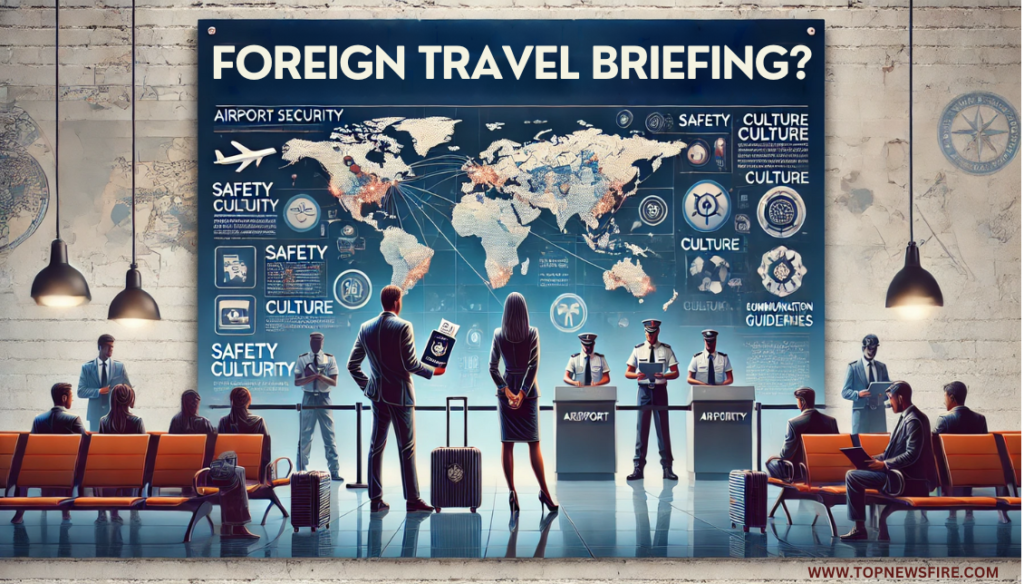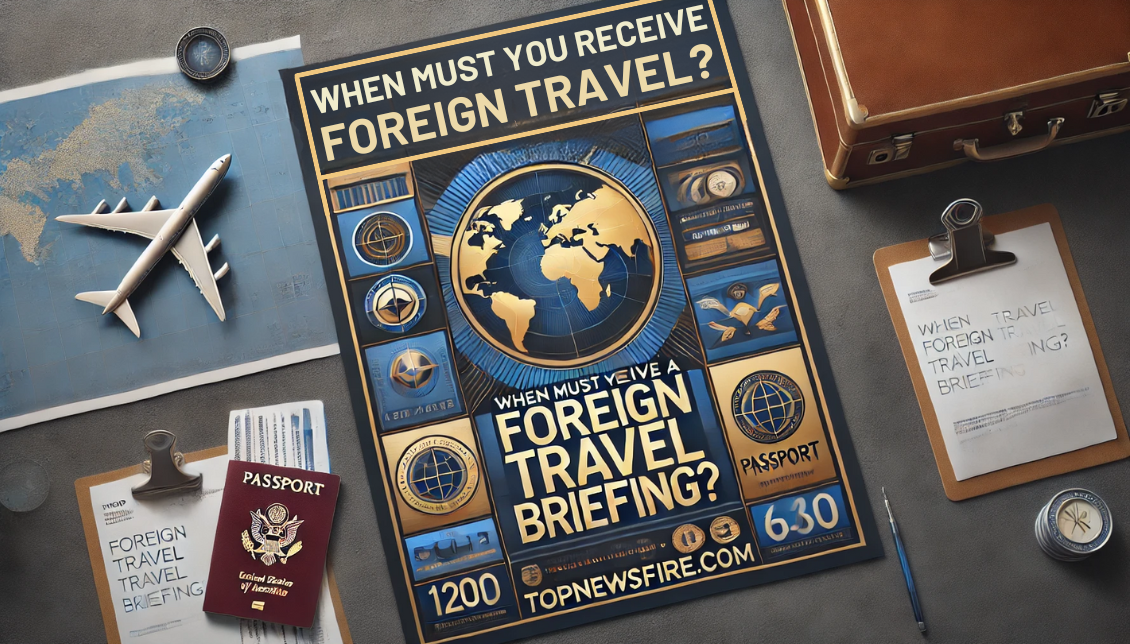Traveling abroad is an exciting experience, but certain individuals, particularly those in sensitive positions, must take extra precautions before embarking on their journey. A foreign travel briefing is often mandatory for government employees, defense personnel, and individuals with access to classified information. Let’s explore when you need to receive a foreign travel briefing and what it entails.
What is a Foreign Travel Briefing?
A foreign travel briefing is a specialized security session aimed at educating travelers about potential risks they may encounter while abroad. It helps travelers:
- Understand the security landscape of their destination.
- Identify potential risks, including espionage, cyber threats, and surveillance.
- Learn how to protect classified information and personal data during their trip.
These briefings are often required for individuals working in sectors that deal with national security, sensitive data, or critical infrastructure.
Who Needs a Foreign Travel Briefing?
Foreign travel briefings are not necessary for all travelers, but they are mandatory in specific cases. Here are the primary groups that must receive a briefing:
1. Government Employees and Contractors
Individuals working for the government, particularly those handling classified information or working in national security roles, are required to receive foreign travel briefings before traveling abroad. This includes:
- Defense personnel
- Intelligence officers
- Diplomatic staff
- Employees with security clearances
2. Military Personnel
Military members, especially those deployed to foreign nations or traveling on official duty, must undergo a foreign travel briefing. This ensures they are aware of:
- Hostile threats
- Foreign surveillance tactics
- Protocols for securing communication
3. Individuals with Security Clearances
Anyone with access to classified information, whether they work in the private sector or the government, must receive a foreign travel briefing before traveling. These briefings help them protect sensitive data and avoid potential foreign intelligence operations targeting them.
You May Also Like: Become a Travel Agent – 10 Essential Steps Guide
When Must You Receive a Foreign Travel Briefing?
The timing of the briefing depends on the nature of the trip and the traveler’s role. In general, you must receive a briefing:

- Before Traveling Abroad: If you work in a sensitive position, a briefing is required before any international travel, regardless of whether it is for personal or business purposes.
- Prior to Official Missions: If your trip is work-related and involves national security or classified material, the briefing is mandatory before departure.
- For Travel to High-Risk Countries: If the destination is considered a high-risk country due to espionage, terrorism, or cyber threats, a briefing is often required, even for personal travel.
Key Topics Covered in a Foreign Travel Briefing
Foreign travel briefings cover a variety of critical security concerns to prepare the traveler for potential risks. Major points include:
- Awareness of Surveillance: Travelers are informed about how foreign governments and organizations might attempt to surveil them.
- Protection of Classified Information: Instructions on how to safeguard classified documents and electronic devices.
- Cybersecurity Measures: Travelers learn how to secure their digital communications and prevent hacking or data theft.
- Health and Safety Tips: Briefings also cover personal safety, such as avoiding dangerous areas and protecting against health risks.
Consequences of Not Receiving a Foreign Travel Briefing
Failure to receive a mandatory foreign travel briefing can result in serious consequences, including:
- Compromising National Security: Traveling without being aware of the risks can make individuals vulnerable to espionage or foreign intelligence operations.
- Loss of Security Clearance: Employees or contractors may face penalties, including the revocation of their security clearance or other disciplinary actions.
- Personal Safety Risks: Without the briefing, travelers may not be aware of potential dangers that could affect their personal safety abroad.
Importance of Regular Briefings
While one briefing may suffice before a single trip, some roles require regular foreign travel briefings due to changing risks and new threats in certain regions. These updated briefings ensure that individuals remain aware of the latest security developments, keeping them and their work safe.
Before attending a foreign travel briefing, it is helpful to:
Preparing for Your Foreign Travel Briefing
- Understand the Purpose of Your Trip: Know the purpose and destination of your travel to receive targeted advice.
- Bring Necessary Documents: Have information on the duration and details of your trip ready.
- Stay Informed: Keep yourself updated on global events, especially those concerning the country you’re visiting.
Conclusion
Foreign travel briefings are essential for those working in sensitive or high-risk roles. If you’re a government employee, military personnel, or hold a security clearance, these briefings are not just a requirement—they are a critical step in safeguarding national security and your personal safety.
in this Article, we bring you the latest on global security and travel updates, ensuring you’re informed on all the important aspects of international travel. Keep visiting Top News Fire for more informative articles and insights on matters that impact you globally.
For more insights into global affairs, security briefings, and travel tips, visit Top News Fire your go-to source for global news and informative articles. Stay informed, stay safe! 🌍✈️
FAQs
Q.1 Who gives foreign travel briefing?
In addition to providing general information on security risks when traveling abroad, your security officer can identify any known security concerns regarding the areas you will be traveling to or the organizations you will be dealing with, as well as the most recent State Department advisories on hazardous conditions Read More..
Q.2 What are three points debriefing should cover?
Three topics are covered in a debriefing: what occurred (the What), why it occurred (the So What), and what ought to occur going forward (the Now What) Read More..
Q.3 What happens if you forget to report foreign travel?
Personnel who neglect to self-report their international travel may be subject to unfavorable administrative actions, such as the suspension or revocation of their eligibility for a security clearance. Read More..
Q.4 Where do you get a defensive foreign travel briefing?
If you would like to learn more about the Foreign Travel Briefing Program or request a briefing prior to your international trip, please contact foreigntravel@doc.gov.




